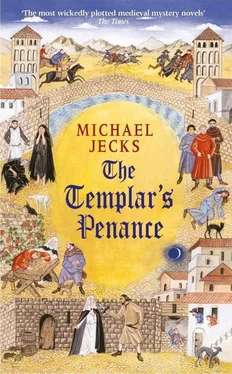Michael Jecks - The Templar
Здесь есть возможность читать онлайн «Michael Jecks - The Templar» весь текст электронной книги совершенно бесплатно (целиком полную версию без сокращений). В некоторых случаях можно слушать аудио, скачать через торрент в формате fb2 и присутствует краткое содержание. Год выпуска: 2014, ISBN: 2014, Издательство: Headline, Жанр: Исторический детектив, на английском языке. Описание произведения, (предисловие) а так же отзывы посетителей доступны на портале библиотеки ЛибКат.
- Название:The Templar
- Автор:
- Издательство:Headline
- Жанр:
- Год:2014
- ISBN:9781472219763
- Рейтинг книги:4 / 5. Голосов: 1
-
Избранное:Добавить в избранное
- Отзывы:
-
Ваша оценка:
- 80
- 1
- 2
- 3
- 4
- 5
The Templar: краткое содержание, описание и аннотация
Предлагаем к чтению аннотацию, описание, краткое содержание или предисловие (зависит от того, что написал сам автор книги «The Templar»). Если вы не нашли необходимую информацию о книге — напишите в комментариях, мы постараемся отыскать её.
The Templar — читать онлайн бесплатно полную книгу (весь текст) целиком
Ниже представлен текст книги, разбитый по страницам. Система сохранения места последней прочитанной страницы, позволяет с удобством читать онлайн бесплатно книгу «The Templar», без необходимости каждый раз заново искать на чём Вы остановились. Поставьте закладку, и сможете в любой момент перейти на страницу, на которой закончили чтение.
Интервал:
Закладка:
‘You agreed to pay him?’ Baldwin asked.
‘But this is madness!’ Don Ruy burst out. ‘I never spoke to you, I never mentioned the contents of your purse, nor did I threaten anything!’
‘You deny this?’ Baldwin said.
‘Yes. Entirely!’
‘He is telling the truth,’ Dona Stefania sneered. ‘He is so courageous, he avoided me, but gave me the message through my maid. She told me so that night, and to escape his clutches, we fled before dawn the next morning. I never dreamed that he would follow so close upon our heels, but the day before yesterday he arrived here and met my maid, proposing a rendezvous so that I could go and pay him.’
‘I only arrived here yesterday!’ Don Ruy cried.
‘You told Joana the day before!’ she declared.
‘I did not!’
‘He told her to make me meet him at a point on the river, and to bring plenty of gold, for he had need of money for lodging. He dared to jest with me about the expense of staying in a city. I can only feel contempt for a man who could be so callous to a poor nun. And then, because some man had taken my mount, and I couldn’t go myself, my maid went in my place, and … and we all know what happened to my poor Joana!’
As she gave herself up to her grief once more, Baldwin watched the knight closely, but saw nothing other than confusion and rising anger. There was nothing to suggest that he was guilty. And yet the maid had died in carrying the money, presumably, to the man she thought was blackmailing Dona Stefania: this knight. ‘What do you say, Don Ruy?’
‘That this is all invention. Why should I demand money? I have sufficient. I saw this lady with her paramour, but thought little of it. I didn’t even realise it was her, it was so dark. It was only the next morning when I heard her maid talking and laughing about her mistress, that I realised who it must have been lying beneath Parceval. We all know that women are tainted with original sin, and that they can use their wiles to snare men, but I didn’t even consider it. I was the loudest voice among my companions of the road arguing that we should have no women among our party, for they only sow dissension. My God! We all know that well enough! This woman has spun a tale to trap me — for what reason, I cannot imagine.’
‘Where were you last afternoon?’ Baldwin asked.
‘I was here in the city.’
‘Is there anyone who could vouch for you?’
Don Ruy looked at Baldwin with loathing. ‘I was alone in my chamber.’
‘You see, we have heard from another witness that you left the city, on a horse. You were seen following a young woman, this lady’s maid, who was murdered a short while later.’
‘I know nothing of this!’ Don Ruy spat.
‘I knew it!’ Dona Stefania shrieked, and pointed with a shaking finger. ‘You took my money, and you killed my messenger! You’d have murdered me as well, if I’d been there, wouldn’t you? Murderer! ’
Chapter Eleven
As he waited, Sir Charles stood in the shade of a great vine that had been trained over some beams. He had plenty of time, but he did wish other men would be a little more punctual.
Behind him, sitting at a table with a jug of wine, his man-at-arms Paul worked at honing his long-bladed knife with a stone. The edge had grown dull with fine rust during the downpours of the last couple of days and Paul, who was nothing if not meticulous with his weapons, had undertaken to give them all a good polish. His bow was already beeswaxed, the string carefully treated and packed in a waxed cloth to keep it dry; his arrows had been inspected individually, the line of each checked for curves, the fletchings stroked to see that they remained flexible. Now he was putting a fine edge on his knife again. ‘A man who looks after his weapons knows that they will look after him,’ he was proud of reciting. It was one of the lines he had been taught many years ago when he had been a squire in training, and he had the annoying habit of bringing up such homilies every so often as though they carried the weight of Gospel truth, rather than being the utterings of a rather boozy and impecunious country knight.
Paul had been brought up in Gloucestershire, where his father had installed him in a noble household so that he might learn the arts of war, but then his old man had made a classical and unfortunate mistake. Just at the time that the lonely, widowed old King was falling for attractive young women, Paul’s father had made a joke about one. His fall from grace was rapid and he had plummeted so far, he had to leave the country.
His son, though, had flourished. Paul was adept with all weapons and soon learned the finer skills of horsemanship. He was one of those men who have an immediate affinity with horses, and could guide his mount almost without conscious effort. Better than that, he was also a thoroughly efficient squire. In the thick of a battle, he never lost his nerve or panicked. Sir Charles was happy to fight knowing that Paul was behind him as a support. If Sir Charles lost his horse, Paul would be there with a remount; if Sir Charles lost a mace, his axe or sword, Paul would canter up with a new one. He almost seemed to know in advance when a weapon was required, and appeared at the instant he was needed, never too early, never late. He was the perfect squire.
They had met when Sir Charles had been a knight in the service of Thomas, Earl of Lancaster, and had remained together even after the trials caused by Boroughbridge.
Earl Thomas was a great lord, and uncle to the King, Edward II. It was said that he was the richest man in the kingdom after the King himself, and Sir Charles believed it. If anything, Earl Thomas was the wealthier of the two. He had none of his nephew’s spendthrift habits, like throwing money at his latest boyfriends, playing with peasants, pretending to act on stage with his pretty boys and the like. It was true that Earl Thomas’s wife had run away, but the Queen herself would have done so too, if she had had the chance. At least Earl Thomas’s woman couldn’t complain about being deserted in her own bed. Queen Isabella didn’t even have the opportunity to take a lover, since all the courtiers were of the King’s sexual persuasion, or so Charles had heard.
It was certainly true that Earl Thomas knew how to win loyalty. He might be more careful than the King with his money, but he didn’t hoard it. He believed in the old system, in spreading his wealth and distributing largesse. Earl Thomas had thrown banquets which put the royal ones to shame, held tournaments in which the prizes were greater than any elsewhere — especially since the monarch had sought to ban them. Everything that Earl Thomas tried, he achieved, and living as part of his household meant that some of his glory was reflected upon Sir Charles. He and Paul were very content there, with plenty to eat, even during the famine, good quality weapons, women to bed, and two new tunics each per year. Few men were so well looked after.
Sir Charles was not troubled by the actual sequence of events. All he knew was that one day, his master, Earl Thomas, had lost favour with the King. He neither knew, nor cared, what possible cause there could be. It didn’t matter a damn. What happened was that the two men had fallen out, and suddenly the King attacked. Earl Thomas’s life came to an end at Boroughbridge, when his men tried to flee by passing over the bridge, only to be opposed by that bastard Andrew Harclay. He and a small force of dismounted soldiers held the bridge and prevented their escape. The King caught Earl Thomas, and executed him.
When the disaster struck, and when they heard of the defeat of the army, Sir Charles and Paul realised that there was no point in their remaining. There was not even a widow to protect; she had left six years before. Sadly, the knight and his man-at-arms joined the long lines of broken men marching away. There was no telling how a vengeful King would treat them, and Sir Charles and his squire left the country, taking a ship to France.
Читать дальшеИнтервал:
Закладка:
Похожие книги на «The Templar»
Представляем Вашему вниманию похожие книги на «The Templar» списком для выбора. Мы отобрали схожую по названию и смыслу литературу в надежде предоставить читателям больше вариантов отыскать новые, интересные, ещё непрочитанные произведения.
Обсуждение, отзывы о книге «The Templar» и просто собственные мнения читателей. Оставьте ваши комментарии, напишите, что Вы думаете о произведении, его смысле или главных героях. Укажите что конкретно понравилось, а что нет, и почему Вы так считаете.












